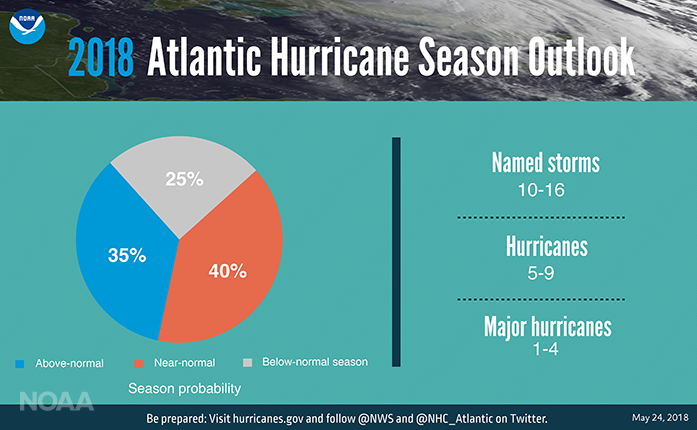
Hurricane Season is Here – Are You Prepared?
The 2017 hurricane season created trying times for those of us in the fuel industry as well as for those who depend on reliable fuel supply for business continuity. While it may not be likely we will have another one-two punch like hurricanes Harvey and Irma, the National Oceanic and Atmospheric Administration, NOAA, is predicting a 75% chance for a near or above normal hurricane season with an expected one to four major hurricanes this year.
No one can predict the when or where of a hurricane; however, we do have the ability to prepare. For those needing fuel, last year’s hurricanes caused both supply and freight sacristy – one compounding the other. However, the compounding effects of Harvey and Irma highlighted key risks organizations face with natural disasters. Fuel supply has been a foreseen issue in the past with major hurricanes, but in the current market place, freight has become more scarce and costly. And with nationwide driver shortages, freight becomes even more valuable and risky.
Mitigating these risks, requires a proactive plan to ensure you have fuel when and where it’s needed – regardless of what Mother Nature or other forces send your way. Creating an Emergency Fuel program is no longer a simple insurance policy, but is a necessity for ensuring business continuity. In today’s market place, unforeseeable and unexpected events are no longer excuses for breaks in supply chains or services. Companies must prove to their stake holders they are able to continue daily business activities during and shortly after an emergency event.
To ensure you are partnering with the right fuel provider, here are some questions to consider:
- Does your current fuel provider do what it takes to work with you during emergency events, or do they call in force majeure?
- Does your fuel provider offer solutions for both supply and freight in times of scarcity?
- Does your current fuel program take into account freight shortages, or do you have to depend on the spot freight market?
- Do your company’s stake holders have expectations for fueling in emergency environments?
- What resources and planning activities are being implemented for these events?
Here are a few things to consider when preparing for an emergency event.
- Work with your fuel supplier to top off all tanks and vehicles.
- Start using retail fuel before the storm, and use any back yard fuel after retail becomes unavailable.
- Contact your fuel provider before an emergency event to go over your emergency fuel plan.
- Consider contracting dedicated assets in advance to support operations while supply and carrier capacity is tight.
We encourage our customers to have a strategy for an emergency fuel event. If you do not feel prepared, or your current fuel provider does not offer these services and consulting, reach out to the Mansfield team. For questions and information on Emergency Fueling and Emergency Planning, contact your Mansfield Sales Rep or Will Shinn at wshinn@mansfieldoil.com.
Source: National Oceanic and Atmospheric Administration
This article is part of Daily Market News & Insights
Tagged:
MARKET CONDITION REPORT - DISCLAIMER
The information contained herein is derived from sources believed to be reliable; however, this information is not guaranteed as to its accuracy or completeness. Furthermore, no responsibility is assumed for use of this material and no express or implied warranties or guarantees are made. This material and any view or comment expressed herein are provided for informational purposes only and should not be construed in any way as an inducement or recommendation to buy or sell products, commodity futures or options contracts.






